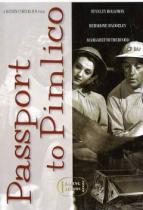Passport to Pimlico
 Year:
Year: 1949
Film Studio: Ealing Studios, Anchor Bay Entertainment
Genre: Comedy
Length: 85 Min.
DirectorHenry Cornelius (1913)
WritingT. E. B. Clarke (1907)...Original Screenplay
ProducerMichael Balcon (1896)
E. V. H. Emmett (1902)
CinematographerLionel Banes (1904)
MusicGeorges Auric (1899)...Composer
StarsStanley Holloway (1890) as Arthur Pemberton
Betty Warren (1905) as Connie Pemberton
Barbara Murray (1929) as Shirley Pemberton
Paul Dupuis (1913) as Duke of Burgundy
John Slater (1916) as Frank Huggins
Jane Hylton (1927) as Molly
Raymond Huntley (1904) as Mr. Wix
Philip Stainton (1908) as PC Spiller
Review Post-war England is in the midst of an extended heat wave, and the local residents of the Pimlico section of London are sweltering under the oppressive heat. Their lives are guided by rationing, shortages and measured allotments of the day-to-day staples that all must live upon. Little do they know that fate is about to turn their normal way of life on its ear. When the last unexploded German bomb of the Blitz is accidentally detonated by a harmless childhood prank, the locals stumble upon an underground chamber filled with treasure. Amongst the valuables is a painting of an unknown nobleman and a charter signed by King Edward IV. The charter leads an historian (Margaret Rutherford) to proclaim that the nobleman is the French Duke of Burgundy, who was thought to have been killed at the Battle of Nancy in 1477. After escaping the battlefield, the Duke had settled into an estate on the outskirts of London and the King has granted him sovereignty over his estate as an extended part of Burgundy. The charter also states that in perpetuity, the residents of the estate are henceforth Burgundian citizens.
At first the locals do not know what to make of these findings, but when the local bank executive informs his boss that he does not have to adhere to British rules because of his Burgundian residency. He sets off a wave of anarchy amongst the population of Pimlico as they decide that maybe being Burgundian might have its advantages. No longer do they have to abide by rationing and curfews and can live their lives unfettered from the rules that all other Englishman must endure. But when the general population of London realizes that Pimlico is a haven from domestic authority, anarchy spreads to create a black market of profiteering on their streets, and they subsequently appeal to Whitehall to solve their growing problem. The government, in a dispute with the citizens over the treasures ownership, decides to
‘close the frontier of Burgundy’ and orders the residents to leave their homes. After surviving the terror of the Blitz, this indignity unites the Burgundians in defiance and as one resident puts it,
“It is because we are English that we fight for our right to be Burgundian!”.
They gather all the remaining food in the neighborhood and start their own rationing program to insure that they can weather the storm of isolation from the government. In the end, when an accident destroys their food supply, they sadly decide to yield to the will of the government and prepare to leave their homes. In the waning moments of their independence, they stand and wait behind the government barricades for the buses that will come to take them away from the neighborhood they’ve known all their life. As the buses arrive, a child’s innocent gesture of gratitude in tossing a piece of fruit to one of the evacuees, unleashes an outpouring of charity from London onlookers, who won’t stand by and watch fellow countrymen being treated in this manner. They start to toss care packages over the barrier and insure that the plucky patriots of Burgundy can resume their fight for self-autonomy.
Ealing Studios was at the peak of its comedic creative power in 1949, releasing
A Run for your Money,
Passport to Pimlico,
Kind Hearts and Coronets and
Whiskey Galore!. Each is a genuine classic and if you are a fan of British humor you can rest assured that each of these films is an excellent way to spend a couple of hours in screening.
Ratings Criterion5 Stars - The pinnacle of film perfection and excellence.
4 ½ Stars - Not quite an immortal film, yet a masterpiece in its own right.
4 Stars - Historically important film, considered a classic.
3 ½ Stars - An entertaining film that’s fun or engaging to watch.3 Stars – A good film that’s worth a Netflix venture.
2 ½ Stars - Borderline viewable.
2 Stars – A bad film that may have a moment of interest.
1 ½ Stars – Insipid, trite and sophomoric, and that's its good points.
1 Star – A film so vacuous, it will suck 2 hours from the remainder of your life.
½ Star - A gangrenous and festering pustule in the chronicles of celluloid.